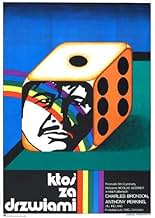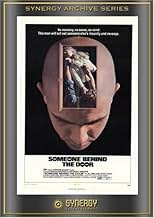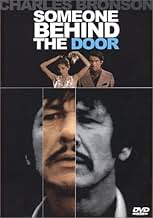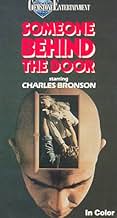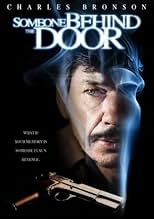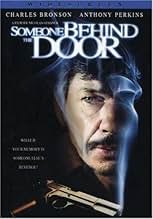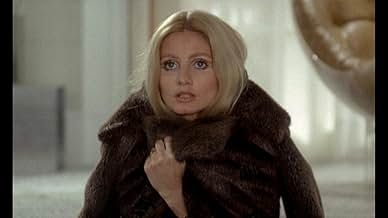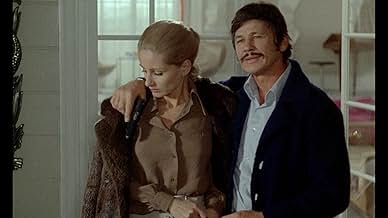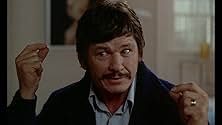Un neurochirurgien trompé par sa femme amène chez lui un amnésique et lui fait croire que la femme adultère est la sienne et le pousse à prendre les «?esures? qui s'imposent.Un neurochirurgien trompé par sa femme amène chez lui un amnésique et lui fait croire que la femme adultère est la sienne et le pousse à prendre les «?esures? qui s'imposent.Un neurochirurgien trompé par sa femme amène chez lui un amnésique et lui fait croire que la femme adultère est la sienne et le pousse à prendre les «?esures? qui s'imposent.
- Réalisation
- Scénario
- Casting principal
- Young Girl on Beach
- (as Viviane Everly)
- Fisherman
- (as Carl J. Studer)
Avis à la une
Late Jill Ireland plays the female part ,as it was often the case in those days,as far Bronson movies were concerned.Nicolas Gessner continued his work with American actors on his follow-up which would be a long time coming (late seventies) "la petite fille au bout du chemin" (the little girl who lives down the lane)and featured Jodie Foster and Martin Sheen.It was probably his best .Then he worked abroad without great success.His most notable work was for French TV "le château des oliviers " (early nineties,with Brigitte Fossey)which gained the audience's approval.
Confined, low-key low-budget French/Italian psychological drama with commendable performances by Charles Bronson and Anthony Perkins. The whole-set-up is like a stage show, were it lies heavily upon the expressively versatile performances and ambitiously novel material. The layer-bound premise is totally illogical, but strangely absorbing with its unforeseeable offbeat nature of offering up numerous surprises, and interestingly unlikely developments. However there are some questionable, teething problems involving the scheming, and its possible outcome. There's just too many cracks, to make it bullet proof that you just wonder if there was much thought put in behind it. Still there are elements that are smartly conceived, and this can be contributed to the manipulative tension (where the repressed anger, and violence is played out through a human tool) and mind-messing that director Nicolas Gessner (the man behind the superb 'The Little Girl Who Lives Down the Lane (1976)') ably works in. As well the believably committed turns of the two leads. Bronson and Perkins worked off each other magnificently. Perkins' cold, planned performance with Bronson's disorientated, assailable figure is sincerely pre-figured. There's no doubt this is one of Bronson's best acting turns. Jill Ireland is adequate in her small role. Gessner's sure-footed direction subtly paints a glum, intrusive puzzle with unique filming techniques that slowly strings you along to a powerfully bitter climax, which finally concludes on an inspired final shot of possible sickening regret. Sometimes it loses out by ponderously stretching it out too much with some raggedy editing, and another weak spot was the playful, but unremarkable misplaced music score by Georges Garvarentz. It just didn't add any sort of punch, or feel. Pierre Lhomme's slick cinematography is steadily framed.
The script (adapted from a novel by Jacques Robert) may not exactly be airtight, but the set-up is still pretty irresistible. Director Nicolas Gessner ("The Little Girl Who Lived Down the Lane") handles things in capable if not overly stylish fashion. Part of the effectiveness stems from enjoying the machinations of this doctor, and how he's spent so much time working on solving his problem. True enough that he may be tops in his field, but as we can see, he's been a highly inadequate husband. Perkins is so much fun to watch in this antagonistic role.
But any fan of Bronson will find this particularly compelling since Bronson is not a macho man of action, but a highly suggestible and vulnerable character (who doesn't even receive a proper name). Ireland delivers one of her better performances as the wife; good support is provided by Henri Garcin as the lover, Adriano Magistretti as Jefferies' brother-in-law, Agathe Natanson as Lucy, and Colin Mann as the police sergeant.
The conclusion to the film may come as disappointing to some viewers, since very little is resolved, but others may find it intriguing that the film ends with a question mark. (All those cuts, back and forth, between two of the main characters get annoying quickly, however.)
Thankfully, "Someone Behind the Door" is over and done in a reasonable amount of time, so at least it doesn't go on longer than it really should.
Seven out of 10.
Directed by Nicolas Gessner, 'Someone Behind the Door' is an occasionally tense psychological thriller that isn't particularly well-written, but features two fine central performances from Bronson as the amnesiac and Anthony Perkins as the neurosurgeon, as well as artistic, stylish cinematography from Pierre Lhomme.
There is an atmosphere of dread and mystery that is palpable from the opening shots, which grows in intensity, ever-building towards an explosive finale. Lhomme's odd use of space and his irregular framing heightens this feeling of intrigue- as well as being visually stimulating to watch. It may not be the work of Sven Nykvist, but it is effective at creating and maintaining the tone of quiet, enigmatic agitation that runs throughout the film.
Perkins and Bronson might seem like an odd combination, but they work together brilliantly (apparently enjoying an off-screen friendship to boot). Bronson powerfully underplays his role, seeming like a cat cornered in a veterinary surgery- his fear, vulnerability and frustration is quite palpable. Bronson shows us the pain someone suffering from amnesia would undergo in a subtle, quiet and very effective manner. Later in the film, when his past is made known to himself and the audience, it is a highly impactful moment solely because of his strong, measured performance (as the writing in the screenplay really is consistently average). There are relatively few times in his career when he would have the opportunity to display his range as an actor- here you can witness one of his more interesting performances.
Perkins was a massively talented, versatile performer and proves that fact once again here. As the duplicitous neurosurgeon, he is seedy, vile and utterly watchable. He brings a natural charm and levity to the role that is most appreciated, as the character is quite contemptible- one could imagine a lesser actor playing him as a one-note, manipulative villain. Perkins was more intelligent than that, making the fellow oddly likable- though still utterly monstrous.
Jill Ireland also has a small role as Perkins' wife, though her performance makes little impact, and the character isn't one of much- if any- depth. However, this is less of a problem with her than it is with the writing. The screenplay is credited to four people- including Gessner and Marc Behm, who wrote the story to 'Charade', among others- and while it has some interesting and tense moments, it is terribly mediocre.
While the central conceit is intriguing- if far-fetched- the story is far too predictable, the dialogue too stilted and the characterization too tenuous to leave a positive lasting impression. Without the depth of Bronson's performance, his character would be incredibly boring and under-written, and without the joy of Perkins' one, his character would be a caricature of an evil doctor- nothing more. How the four writers couldn't come up with some good dialogue or meaningful characterization is confounding, considering they all proved their talent when working on other projects.
All that said, the film is entertaining and suspenseful, due in large part to the stylish camerawork and fine central performances from the lead actors. While 'Someone Behind the Door' suffers from derivative, lifeless screenwriting at times, it's not a bad film, containing some genuinely surprising moments of real tension. For fans of Bronson and Perkins, it's highly recommended- though fans of Gessner's signature, strange brand of cinema might be a little bit disappointed.
Le saviez-vous
- AnecdotesAlthough this is a French film, none of the three lead actors is French. Bronson and Perkins are American (although the latter seems to be playing an Englishman) and Jill Ireland is British, although she had been working and living in America for some years by then. The rest of the cast is European. In addition, the film was shot in an English version as well as a French one. The director was Hungarian.
- GaffesAfter Frances finishes her bath, she says to her husband Larry, "Gary, I have to get dressed."
- Citations
The Stranger: How long am I gonna stay here?
Laurence Jeffries: Well, that depends.
The Stranger: It's, uh, considerate of you.
Laurence Jeffries: Not at all, it's my job.
The Stranger: Uh, what was in that, uh, shot you gave me?
Laurence Jeffries: Are you feeling sleepy?
The Stranger: Yeah...
Laurence Jeffries: Good.
- ConnexionsReferenced in Bleeder (1999)
- Bandes originalesSymphony No. 9 in E minor Op. 95 'From the New World' II. Largo
Written by Antonín Dvorák (as A. Dvorak)
Meilleurs choix
- How long is Someone Behind the Door?Alimenté par Alexa
Détails
Contribuer à cette page


